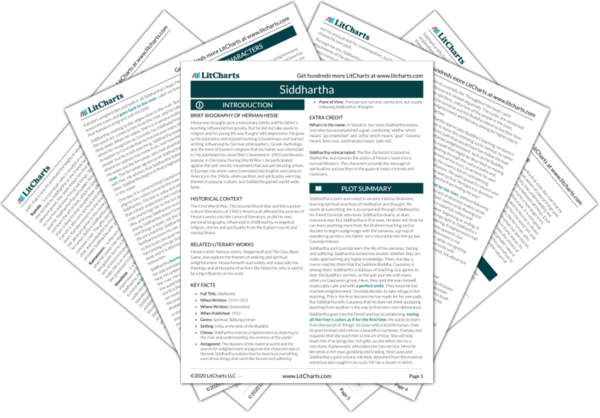Brief Biography of Hermann Hesse
Hesse was brought up in a missionary family and his father’s teaching influenced him greatly. But he did not take easily to religion and his young life was fraught with depression. He gave up his education and started working in bookshops and started writing, influenced by German philosophers, Greek mythology, and the texts of Eastern religions that his father was interested in. He published his novel Peter Camenzind in 1903 and became popular in Germany. During World War I, he participated against the anti-semitic movement that was persecuting artists in Europe. His works were translated into English and came to America in the 1960s, when pacifism and spirituality were big themes in popular culture, and Siddhartha gained world-wide fame.
Historical Context of Siddhartha
The First World War, The Second World War and the counter-culture liberations of 1960’s America all affected the journey of Hesse’s works into the canon of literature, as did his own personal biography, influenced in childhood by evangelical religion, stories and spirituality from the Eastern world, and mental illness.
Other Books Related to Siddhartha
Hesse’s other famous works, Steppenwolf and The Glass Bead Game, also explore the themes of seeking and spiritual enlightenment. Hesse himself read widely and especially the theology and philosophy of writers like Nietzche, who is said to be a big influence on his work.
Key Facts about Siddhartha
-
Full Title: Siddhartha
-
When Written: 1919-1921
-
Where Written: Switzerland
-
When Published: 1922
-
Genre: Spiritual, Bildungsroman
-
Setting: India, in the time of the Buddha
-
Climax: Siddhartha reaches enlightenment by listening to the river and understanding the oneness of the world
-
Antagonist: The illusions of the material world and the search for enlightenment antagonize the characters but in the end, Siddhartha realizes that he must love everything, even those things that seem like illusion and suffering
-
Point of View: Third person narrator, omniscient, but usually following Siddhartha’s thoughts
Extra Credit for Siddhartha
